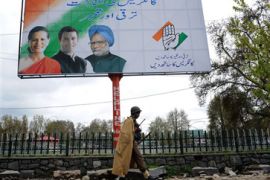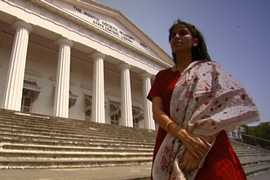Congress seeks return to past glory
Can the party’s focus on unity withstand India’s increasingly fractured politics?

 |
| Priya Dutt, a Congress party MP, campaigns for re-election in a Mumbai slum |
If the rich and powerful are coming to the slums, it must be election season. In the late afternoon Mumbai sun, an excited procession is making its way down the dusty path.
There is a large man with a megaphone making a lot of noise. “Priya Dutt, Priya Dutt, Sonia Gandhi,” he shouts again and again. Supporters wave enormous flags and children scamper alongside.
We are walking between tiny shacks put together from corrugated iron, and a foul smelling canal, its fetid waters a sinister shade of grey, its banks covered in filth and rubbish.
| In video | ||
|
|
Priya Dutt, the local Congress party MP, is campaigning for re-election. She is a friendly, approachable woman, perhaps a little shy given all the commotion around her.
Her aides believe her chances are good; they tell me that some 70 per cent of her constituency are slum-dwellers, including many Muslims and lower-caste Hindus who have tended to
| Special report |
 |
vote for Congress in the past.
This, according to Priya, is proof that Congress still stands for its original ideals, of social justice and a united India.
“You look at any other party and their whole issue is about religion, or caste, it’s about a temple or a mosque.
“But Congress is secular, it talks about progress, development, it talks about taking India forward, and not dividing it,” she says.
The history of modern India and the Congress party are entwined.
This, of course, is the party of Mahatma Gandhi, the party that led the struggle against British rule which culminated with independence in 1947.
Moreover, since then, Congress has usually been in power.
Family politics
Many argue that Congress’ dominance of Indian politics has not been good for democracy. In particular, they point to the almost feudal hold of one family over the party, and hence the country.
Jawarharlal Nehru was India’s first prime minister, and although Congress has long since abandoned his moderate socialism, his family still leads the party, 60 years after independence.
At different times since Nehru’s death, India has been led by his daughter, Indira Gandhi, and his grandson, Rajiv Gandhi.
The current Congress party president, Sonia Gandhi (and, so the opposition alleges, the real power in today’s government) is Rajiv’s widow.
And, increasingly, it appears that Sonia’s son, Rahul Gandhi, is positioning himself as the prince-in-waiting, should Manmohan Singh, India’s elderly prime minister, step aside.
‘Crime, corruption, incompetence’
Critics say that Congress is tainted by corruption and failure.
In downtown Mumbai I met Mona Shah, a forceful and impressive woman who is standing for parliament for the recently-formed Professionals Party of India (PPI).
 |
| Mona Shah’s campaign is focusing on security and infrastructure |
The PPI was formed in reaction to what it calls the “crime, corruption, indiscipline and incompetence that have become a way of life” in modern India.
I asked Shah what she thinks Nehru would make of modern India.
“I think he would be so ashamed … that 62 years after independence, this great glorious country has landed itself in this state where there is squalor, poverty, malnutrition, not enough sanitation, there is not enough clean drinking water … there is not enough food,” Shah said.
In truth, the modern Congress is a pale shadow of what it once was.
Its share of the vote has been steadily falling for decades. The days when it could win a parliament majority have long since passed; even when it, surprisingly, emerged as the largest party in the 2004 elections, it took barely a quarter of the vote, and had to cobble together an unwieldy coalition to form a government.
Inclusive, national party
Back at the rally in the Mumbai slum, Priya Dutt has boarded a truck, and is waving at the crowds lining the streets.
In the best tradition of Congress, Priya herself comes from something of a dynasty; her parents, Sunil and Nargis Dutt, were both Bollywood legends, and Congress MPs.
Sunil was a Hindu, Nargis a Muslim, and Priya has married a Christian. It is a neat encapsulation of the secular values Congress has espoused, more or less consistently, ever since independence.
And even today, for all its flaws and failures, Congress is still the closest thing India has to an inclusive, national party.
But as the election draws closer, the party leaders will be wondering whether this will be enough to return it to power, at a time when Indian politics are fracturing along regional, religious and caste lines.
